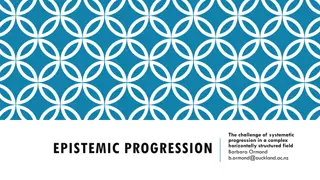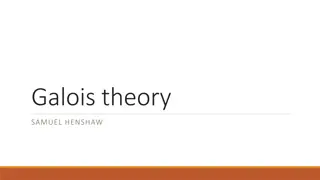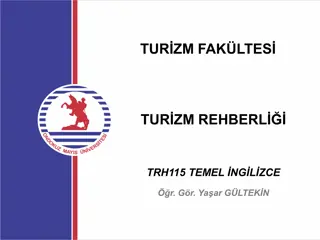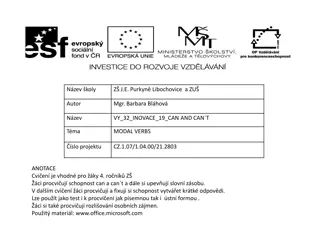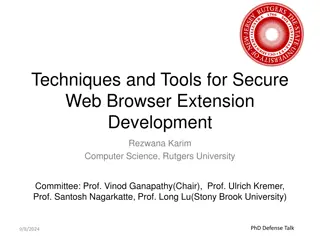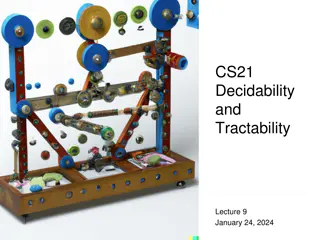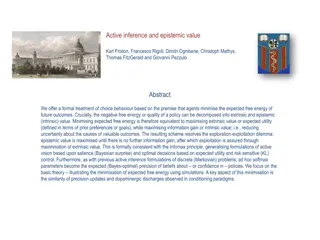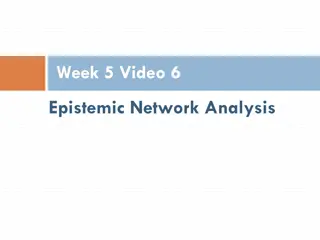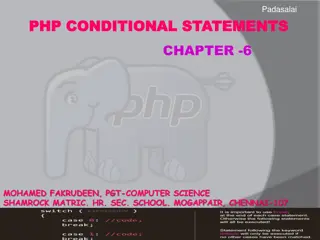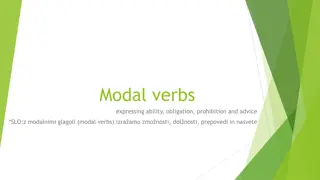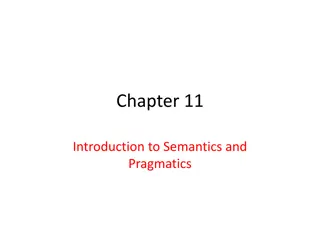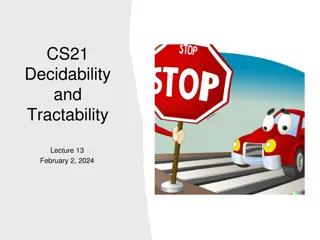Decidability and Extensions of Modal Epistemic Logics
The research delves into the introduction of the new modal epistemic logic E.P, derived from the infinitely valued ukasiewicz logic by incorporating an axiom of the logic P of perfect MV-algebras. The study explores the enrichment of the language with a "quasi-knowledge operator" and establishes the recursively enumerable nature of the set of theorems of logic E.P. Additionally, the extension of finitely valued propositional calculi to predicate calculi, particularly the monadic MV-algebras, and the introduction of monadic logic and MV-algebras are discussed in detail.
Uploaded on Feb 21, 2025 | 0 Views
Download Presentation

Please find below an Image/Link to download the presentation.
The content on the website is provided AS IS for your information and personal use only. It may not be sold, licensed, or shared on other websites without obtaining consent from the author.If you encounter any issues during the download, it is possible that the publisher has removed the file from their server.
You are allowed to download the files provided on this website for personal or commercial use, subject to the condition that they are used lawfully. All files are the property of their respective owners.
The content on the website is provided AS IS for your information and personal use only. It may not be sold, licensed, or shared on other websites without obtaining consent from the author.
E N D
Presentation Transcript
. ( : , ) 2017 , , ELP
Ivane Javakhishvili Tbilisi State University Faculty of exact and Natural Sciences 2017 Decidability of the Logic E P Revaz Grigolia , Antonio Di Nola, Giacomo Lenzi
ABSTRACT The new modal epistemic ukasiewicz logic E Pis introduced, obtained from the infinitely valued ukasiewicz logic by adding one axiom of the logic Pof perfect MV-algebras, the language of which is enriched by "quasi know-ledge operator" with corresponding axioms. It is proved that the set of theorems of the logic E P is recursively enumerable.
Monadic MV-algebras The finitely valued propositional calculi, which have been described by ukasiewicz and Tarski in 1930, are extended to the corresponding predicate calculi. The predicate ukasiewicz valued) logic QL is defined in standard way. (infinitely
Monadic MV-algebras Monadic MV-algebras were introduced and studied by Rutledge in [J.D. Rutledge, A preliminary investigation of the infinitely many-valued predicate calculus, Ph.D. Thesis, Cornell University, 1959.] as an algebraic model for the predicate calculus QL of ukasiewicz infinite valued logic, in which only a single individual variable occurs.
Monadic Logic Let L denote a first-order language based on , +, , , and let Lm denote a propositional language based on , +, , , . Let Form(L) and Form(Lm) be the set of all formulas of L and Lm, respectively. We fix a variable x in L, associate with each propositional letter p in Lma unique monadic predicate p (x) in L and denote by induction a translation : Form(L) Form(Lm) (p) = p (x) if p is propositional variable, ( ) = ( ) ( ), where { , +, }, ( ) = x ( ). by putting:
MV-algebras An MV-algebra is an algebra A = (A, , , *, 0, 1) where (A, , 0) is an abelian monoid, and for all x,y A the following identities hold: x 1 = 1, x** = x, (x* y)* y = (x y*)* x, x y = (x* y*)*.
MV -algebras It is well known that the MV-algebra S = ([0, 1], , , *, 0, 1), where x y = min(1, x+y), x y = max(0, x+y -1), x* = 1-x, generates the variety MV of all MV-algebras. Let Q denote the set of rational numbers, for (0 ) n we set Sn=(Sn, , , *, 0, 1), where Sn= {0, 1/n-1, , n-2/n-1, 1} is also MV- algebra.
Perfect MV-algebras From the variety of MV-algebras MV select the subvariety MV(C) which is defined by the following identity: (Perf) 2(x2) = (2x)2, that is MV(C) = MV+ (Perf).
Logic P Pis the logic corresponding to the variety generated by perfect MV-algebras which coincides with the set of all ukasiewicz formulas that are valid in all perfect MV-chains, or equivalently that are valid in the MV-algebra C. Actually, Pis the logic obtained by adding to the axioms of ukasiewicz sentential calculus the following axiom: P: ( )&( ) ( & ) ( & )
Logic P Theorem. A formula of the logic Pis a theorem iff it is 1-tautology in the algebra C.
Monadic MV-algebras An algebra A =(A, , , *, , 0, 1) (also denoted as (A, )) is said to be a monadic MV-algebra (for short MMV-algebra) [A.Di Nola, R.Grigolia] if (A, , , *, 0, 1) is an MV-algebra and in addi- tion satisfies the following identities: E1. x x, E2. (x y) = x y, E3. ( x)* = ( x)*, E4. ( x y) = x y, E5. (x x) = x x, E6. (x x) = x x.
ukasiewicz logic The original system of axioms for propositional infinite-valued ukasiewicz logic used implication and negation as the primitive connectives as for classical logic: L1. ( ( )) L2. ( ) (( ) ( )) L3. (( ) ) (( ) ) L4. ( ) ( ). There is only one inference rule - Modus Ponens: from and ( ) infer .
ukasiewicz logic Theorem 2. [Chang]. (Completeness theorem). A Lukasiewicz formula is a theorem iff is a tautology.
Logic P Pis the logic obtained by adding to the axioms of ukasiewicz sentential calculus the following axiom: P: ( )&( ) ( & ) ( & )
Monadic ukasiewicz Logic M Monadic ukasiewicz propositional calculus M as a logic which contains Lukasiewicz propositional calculus , the formulas as the axiom schemas: M1. q , M2. q( ) q q , M3. q( q ) q , M4. q( q & q ) q & q , M5. q( & ) q & q , M6. q( ) q q , inference rules: , / , / q .
Monadic ukasiewicz Logic M Theorem 3. [Rutleddge; Di Nola, Grigolia]. A modal formula is a theorem of M if it is a tautology
Logic EP Modal Epistemic Lukasiewicz logic E Pis a logic which contains monadic ukasiewicz proposi- tional calculus M and the formula as the axiom scheme: P: ( )&( ) ( & ) ( & )
Logic EP Theorem 4. A formula of E Pis a theorem if it is a tautology.
Decidability of EP In the sequel Form(L) denotes the set of all formulas of the logic L and Th(L) the set of all theorems of the logic L. A set X is called recursive (or decidable) if there is an algorithm which, given an object x from the class under consideration, recognizes whether x X or not. X is said to be recursively enumerable if one of the following equivalent conditions is satisfied: 1) X is the domain of a partial recursive function; 2) X is either the range of a total recursive function or empty.
Decidability of EP Proposition 1. Suppose Y is a recursive set and X Y . Then X is recursive iff both X and Y X are recursively enumerable.
Decidability of EP Proposition 1. Suppose Y is a recursive set and X Y . Then X is recursive iff both X and Y X are recursively enumerable. Proposition 2. [Chagrov and Zakharyaschev]. (1) Form(L) is recursively enumerable (without repetitions). Moreover, these sets are recursive. (2) The set Th(L) of theorems of a logic L with a recursively enumerable set of axioms is also recursively enumerable.
Decidability of EP Proposition 3. (Craig's theorem) For every logic L the following conditions are equivalent: (i) L has a recursively enumerable set of axioms; (ii) L has a recursive set of axioms; (iii) Th(L) is recursively enumerable.
Decidability of EP Proposition 4. [Chagrov and Zakharyaschev]. If theorems of a logic L is characterized by a recursively enumerable class C of recursive algebras then the set of formulas that are not theorems in L is also recursively enumerable.
Decidability of EP Proposition 4. [Chagrov and Zakharyaschev]. If theorems of a logic L is characterized by a recursively enumerable class C of recursive algebras then the set of formulas that are not theorems in L is also recursively enumerable. Proposition 5. [Chagrov and Zakharyaschev]. A logic is decidable if it is recursively axiomatizable and charcharacterized by a recursively enumerable class of recursive algebras.
Decidability of EP Theorem 5. The axiomatizable recursively algebras logic E P is recursively charcharacterized enumerable class and by a of recursive
Decidability of EP Theorem 5. The logic E Pis decidable.



